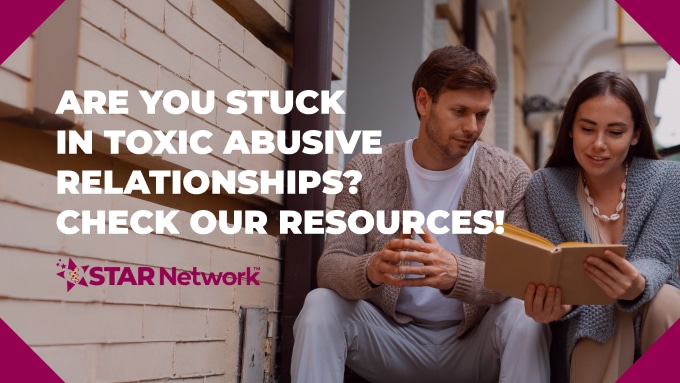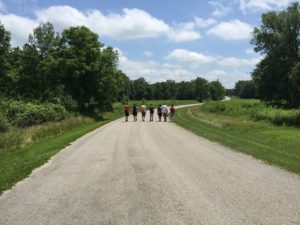Trauma-Informed Blog
New content weekly! Survivor Stories, Research Articles, Poetry, and more written by clinicians, coaches, survivors, and mental health professionals.

Featured Partner: STAR Network
Discover more about overcoming Toxic Abusive Relationships (TAR), trauma, and building resilience with our featured partner and ally, STAR Network. Their resources empower you to embrace your strength and transformation – you are not a victim; you are now a STAR, a Survivor of Toxic Abusive Relationships. Click the banner or visit STAR Network to explore their resources and start your journey to healing and empowerment today.
Remember...
CPTSD Foundation is not crisis care. If you ever feel you are in crisis please reach out to an online or local crisis resource, or contact your mental health or medical provider. CPTSD Foundation provides a tertiary means of support; adjunctive care. Our industry-leading ancillary products and services are intended to supplement individual therapy. Nothing on this website or any associated CPTSD Foundation websites, is a replacement for or supersedes the direction of your medical or mental health provider, nor is anything on this or any associated CPTSD Foundation website a diagnosis, treatment plan, advice, or care for any medical or mental health illness, condition, or disease.
How Trauma Impacts Youth in Foster Care (Part 2 of 3)
This article is the second in a three-part series designed to bring awareness to the issue of complex PTSD among foster youth, how C-PTSD affects foster youth who are nearing the age of...
The Mental Health Benefits of Prayer
When the word prayer comes to mind one might conjure images of organized religious services. However, prayer is a much richer and more meaningful experience than only that experienced through...
How Trauma Impacts Youth in Foster Care (Part 1 of 3)
This article is the first of a three-part series designed to bring awareness to the issue of complex PTSD among foster youth, how C-PTSD affects foster youth who are nearing the age of transition...
Mindfulness for Healing from Complex Post-Traumatic Stress Disorder
All human beings have a tendency to relive trauma even decades after it has ended. Those living with the effects of complex post-traumatic stress disorder tend to ruminate and live their lives in...
A New Beginning, A Survivor Story of Never Losing Hope.
Self-blame, insecurity, depression, codependency, helplessness... There has to be something wrong with me. Right? I learned from a young age that I had to work through life by sacrifice. It does...
The Benefits of Mindfulness, Prayer, and Meditation
Those of our readers who live with the effects of complex post-traumatic stress disorder understand better than most how chaotic the mind can become. The hustle of the world, coupled with the...
To Guide Your Path – A Survivor Poem
Keep your head up, your spirits high. Keep learning new ways to fly. Choose your friends with care, Lest you stumble and not have them there. Don’t be swayed by the ways of the others you...
Some Final Thoughts on Family Estrangement
In this series, in December, we have examined together what family estrangement is, some of its causes, and how we can learn to enjoy our lives despite being separated from our family of origin....
The Positive Side of Family Estrangement and Creating a Family of Choice
This series on family estrangement may seem to be a strange topic to cover during the holiday season. Yet, being separated from family during Thanksgiving, Christmas, and New Year’s is a familiar...
The Commonality of and Coping with Family Estrangement
Family Estrangement is an emotional distancing and cessation of communication between one or more members of a family. It is the breakdown of the support from and to a person who can no longer...
The Diamond in My Heart- Poem by Jennifer “Kaylene” Carter
The Diamond in My Heart -Survivor Poem by Jennifer "Kaylene" Carter If I never accomplished another thing, Would you still love me? If I couldn’t live up to the image you see, Would you...
‘I Can’t Remember. But…’ Insight into a New Blog Series.
As a new and honored guest writer/blogger with the CPTSD Foundation I am going to start this journey with a series of six-week short articles linking thoughts, experiences, reflections, and...

What is Complex Post-Traumatic Stress Disorder?
“Complex PTSD comes in response to chronic traumatization over the course of months or, more often, years. This can include emotional, physical, and/or sexual abuses, domestic violence, living in a war zone, being held captive, human trafficking, and other organized rings of abuse, and more. While there are exceptional circumstances where adults develop C-PTSD, it is most often seen in those whose trauma occurred in childhood”.












